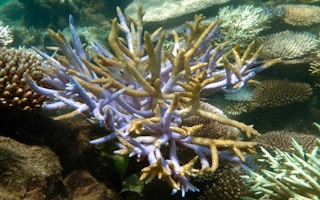An outbreak of yellow-band disease, historically only found in the Caribbean reefs but that has recently killed corals over vast stretches of Thailand’s sea floor, is raising alarm bells among scientists and marine ecologists in the region.
To continue reading, subscribe to Eco‑Business.
There's something for everyone. We offer a range of subscription plans.
- Access our stories and receive our Insights Weekly newsletter with the free EB Member plan.
- Unlock unlimited access to our content and archive with EB Circle.
- Publish your content with EB Premium.
The worry is that more of Asia Pacific’s beautiful corals — from Australia’s Great Barrier Reef to the Tubbataha in the Philippines and Raja Ampat in Indonesia — could be at risk.
Yellow-band disease, so named for the colour it turns corals before destroying them, was first detected in Asia’s reefs late last year. The rapidly spreading disease had affected stretches of corals near Pattaya, off Thailand’s east coast. By the time it was detected, it had already spread across roughly 600 acres of the sea. Local marine ecologists reported seeing it wherever they went.
There are challenges, however, to diagnosing coral diseases and attributing causality. Scientists studying the recent outbreak have been struggling to make sense of the event and find an eventual cure or a way to slow the progression of the disease. Dr. Carly Randall, an ecologist at the Australian Institute of Marine Science (AIMS), told Eco-Business that “corals only have a few ways to show signs of disease” and it is unknown yet whether the yellow-band disease found to have killed Thailand’s reefs is caused by the same pathogen(s) as in the Caribbean.
“We do know, however, that climate warming is increasing the incidence of coral diseases and making corals more susceptible to opportunistic pathogens, which reduces their immunity. With the warmer-than-average summer temperatures, this could be what led to the disease showing up in Thailand,” she said.
 Dr. Carly Randall said that climate warming is increasing the incidence of coral diseases. Image: Australian Institute of Marine Science
Dr. Carly Randall said that climate warming is increasing the incidence of coral diseases. Image: Australian Institute of Marine Science“I think it is a very serious issue…and along with warming oceans, should be considered as a consequence of climate change…If we want to see reduced disease outbreaks, we need to address climate change.”
Randall, whose marine science career began in the Caribbean, is an expert on reef restoration who has researched mitigation techniques against yellow-band disease. She added that “signs of disease could occur on corals anywhere” and the worry is that disease incidence will increase in the region, following heat stress. “We have seen new diseases spreading rapidly in recent years, which is concerning.”
Scientists believe overfishing, pollution and rising water temperatures because of climate change may be making the reefs more vulnerable to yellow-band disease. Records now show that the world’s oceans were the hottest ever recorded in 2022 — an international team of scientists working on a new ocean heat analysis found an ever-deeper layer of warm water on the ocean surface.
More than 90 per cent of global warming heat is absorbed by the ocean.
Randall highlighted coral rescue and biobanking as two options to consider if the outbreak in Thailand reaches a point deemed uncontrollable. “If we can determine what is causing it, we may be able to develop targeted treatments that can be used in the future, ” she said, but ultimately the world needs to work on addressing the underlying problem — rising emissions.
Coral rescue typically involves identifying reefs that are more resilient to climate change and extracting their genes to seed them in other areas. Samples of endangered coral can also be stored in biobanks in order to preserve the species.
In Thailand, marine ecologists are now actively monitoring the situation. They have gone on diving expeditions to photograph infected corals, take measurements and photographs, as well as collect samples for examination.
Thai marine authorities are using social media to track the reports of infected reefs, and have also sought the public’s help to report sightings of corals they think are affected.
Corals are one of the world’s most important natural resources and the pillars on which marine and coastal ecosystems are built. The loss of corals can have calamitous impacts as a reef contributes to many services, from providing a habitat to an immense number of marine species, to protecting the coast from storms, and serving as a source of food.
The loss of reefs could bring with it the loss of eco-tourism which many locals earn their livelihoods from. The commercial fishing industry would also be at risk.
In total, the loss of resources and services provided by coral reef systems could cost the world as much as US$375 billion annually.










